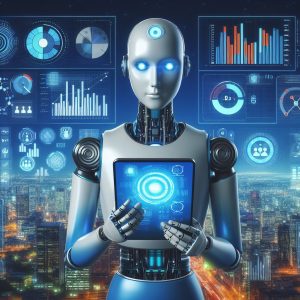In today’s digital age, content marketing has become a cornerstone of marketing strategies for businesses of all sizes. With the explosion of information available online, it’s more important than ever to create high-quality, engaging content that stands out from the noise and resonates with your target audience.
Artificial intelligence (AI) is rapidly transforming the content marketing landscape. From content creation and optimization to audience targeting and performance analysis, AI-powered tools and technologies are revolutionizing the way marketers plan, create, and distribute content.
In this blog post, we’ll explore the role of AI in content marketing and creation, discussing how AI can help you:
- Generate high-quality, engaging content at scale
- Optimize your content for search engines and social media
- Personalize your content for different audiences
- Analyze your content performance and make data-driven decisions
How AI Can Help You Generate High-Quality, Engaging Content at Scale
One of the most significant ways AI is impacting content marketing is by enabling the creation of high-quality, engaging content at scale. AI-powered content generation tools can quickly and easily create articles, blog posts, product descriptions, and other types of content.
These tools use natural language processing (NLP) and machine learning algorithms to analyze large datasets of text, images, and videos to identify patterns and generate human-like text that is both informative and engaging.
For example, AI-powered content generation tools can be used to:
- Create blog posts on a variety of topics in a matter of minutes
- Write product descriptions that highlight the benefits and features of your products
- Generate social media posts that are tailored to your target audience
- Create scripts for videos and podcasts
How AI Can Help You Optimize Your Content for Search Engines and Social Media
Another way AI is helping content marketers is by optimizing content for search engines and social media. AI-powered SEO tools can analyze your content and identify areas where it can be improved to rank higher in search results.
These tools can also help you identify relevant keywords and phrases to include in your content, as well as optimize your content for other factors that affect search engine rankings, such as title tags, meta descriptions, and image alt tags.
Similarly, AI-powered social media optimization (SMO) tools can help you optimize your content for social media platforms. These tools can analyze your content and identify areas where it can be improved to increase engagement and virality.
For example, AI-powered SMO tools can help you:
- Identify the best times to post your content on social media
- Choose the right images and videos to include in your posts
- Write compelling social media captions that will grab attention
- Track the performance of your social media posts and make adjustments as needed
How AI Can Help You Personalize Your Content for Different Audiences
Personalization is a key trend in content marketing today. Audiences are more likely to engage with content that is relevant to their interests and needs.
AI can help content marketers personalize their content for different audiences by analyzing audience data and identifying common interests and preferences. This information can then be used to create content that is tailored to the specific needs of each audience segment.
For example, AI-powered personalization tools can be used to:
- Create personalized email campaigns that target specific customer segments
- Recommend products and services to customers based on their past purchase history and browsing behavior
- Create personalized content experiences on your website or blog
How AI Can Help You Analyze Your Content Performance and Make Data-Driven Decisions
Finally, AI can help content marketers analyze their content performance and make data-driven decisions. AI-powered content analytics tools can track the performance of your content across different channels and platforms, providing you with valuable insights into what’s working and what’s not.
This information can then be used to make data-driven decisions about your content strategy, such as:
- Which topics and formats are performing best
- Which channels and platforms are driving the most traffic and engagement
- Which audience segments are most engaged with your content
- How you can improve the performance of your content
AI is rapidly transforming the content marketing landscape. From content creation and optimization to audience targeting and performance analysis, AI-powered tools and technologies are revolutionizing the way marketers plan, create, and distribute content.
By leveraging the power of AI, content marketers can create high-quality, engaging content at scale, optimize their content for search engines and social media, personalize their content for different audiences, and analyze their content performance to make data-driven decisions.
As AI continues to evolve, we can expect to see even more innovative and powerful ways for marketers to use AI to improve their content marketing efforts.
Dangers for Content Marketers in the Marketing Industry
- Automation: Automated content creation tools can generate blog posts, articles, social media posts, and other forms of content quickly and easily. This can reduce the need for human content marketers.
- Artificial Intelligence (AI): AI-powered content generation tools can create content that is indistinguishable from human-generated content. This could make it difficult for content marketers to compete.
- Data-driven Content: Data-driven content is created using data analysis to identify what content is most likely to resonate with a target audience. This can reduce the need for content marketers to rely on guesswork or intuition.
Possibilities of Content Marketing Jobs Being Replaced by AI
- Content Generation: AI can be used to generate a wide variety of content quickly and easily. This could potentially eliminate the need for human content marketers who are responsible for creating content.
- Content Curation: AI can be used to curate content from a variety of sources and present it in a way that is relevant and engaging to a target audience. This could potentially eliminate the need for human content marketers who are responsible for finding and organizing content.
- Content Distribution: AI can be used to distribute content across a variety of channels, including social media, email, and paid advertising. This could potentially eliminate the need for human content marketers who are responsible for promoting content.
How AI Will Be Used to Help Content Marketers
- Content Idea Generation: AI can be used to generate ideas for content that is relevant and engaging to a target audience. This can help content marketers come up with new and creative ideas for content that will resonate with their audience.
- Content Optimization: AI can be used to optimize content for search engines and social media. This can help content marketers get their content in front of a wider audience.
- Content Personalization: AI can be used to personalize content for individual readers. This can help content marketers create content that is more relevant and engaging to each individual reader.
- Content Analytics: AI can be used to track the performance of content and identify what content is working well and what content is not. This can help content marketers make better decisions about what kind of content to create in the future.
How Content Marketers Can Adapt to the Changing Landscape
- Become a Content Strategist: Content strategists are responsible for planning and executing a content marketing strategy. This includes identifying target audiences, developing content goals, and creating a content calendar.
- Learn Data Analytics: Data analytics is essential for measuring the performance of content marketing campaigns and identifying what content is working well and what content is not.
- Develop AI Skills: Content marketers who develop AI skills will be more likely to be able to use AI to their advantage. This includes understanding how AI works and how it can be used to create, optimize, and distribute content.
- Stay Ahead of the Curve: Content marketers who stay ahead of the curve will be more likely to succeed in the changing landscape. This includes keeping up with the latest trends in content marketing and experimenting with new technologies.
Conclusion
The marketing industry is changing rapidly, and AI is playing a major role in this change. Content marketers who want to stay ahead of the curve need to adapt to the changing landscape and learn how to use AI to their advantage. By following the tips in this blog post, content marketers can position themselves for success in the years to come.



